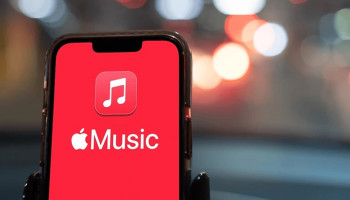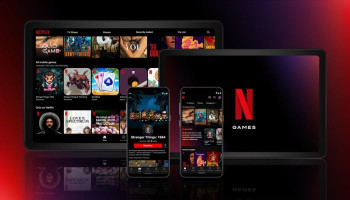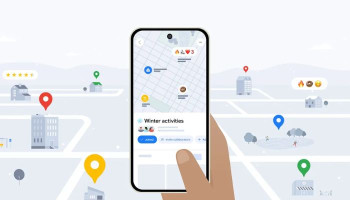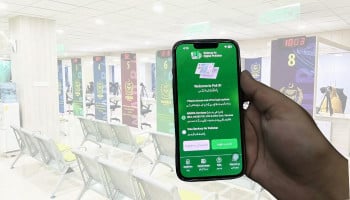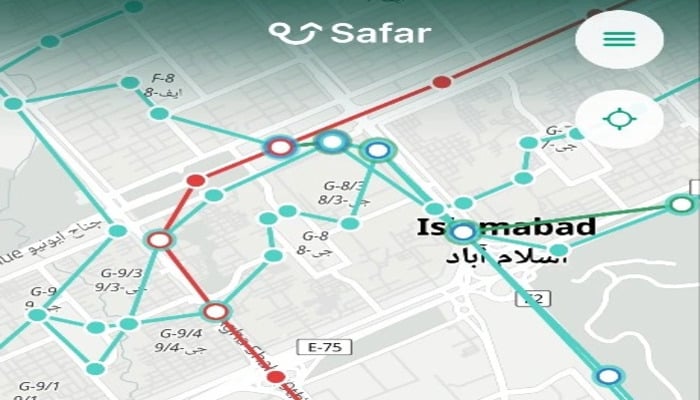
While most in Pakistan might have grown accustomed to the unpredictable schedules and uncertain routes of insufficient and poorly managed public transport, Abdullah Qaisar, a 26-year-old software engineer from Islamabad, took it upon himself to change this.
Driven by this chaos and his frustration over uneven bus schedules and routes, he saw this as an opportunity that clung to his thoughts, compelling him to build an app he named Safar. The app serves as a reliable guide for metro and feeder bus routes, including those that the government has yet to implement.
Safar, his brainchild, is not just an app. Instead, it's a lifeline for thousands of commuters dependent on public transport navigating the complex web of Pakistan’s metro and electric bus networks.
Qaiser launched Safar around the end of 2024, and the app has already amassed 15,000 active users in this brief span. To make his invention more useful and ensure its subsequent ascent to the limelight, he mapped over 25,000 routes across Islamabad and Rawalpindi. This paints a beautiful picture of how technology can transform urban mobility in developing nations.
The spark for Safar came from Qaiser's frustration. “I used to see these shiny new electric buses near my home, but I had no idea where they went,” he recalled.
In an exclusive conversation with Gadinsider, he explained that his online searches for routes and schedules fetched him bits of information available across Facebook groups and WhatsApp chats.
“As a software engineer, I realised automation could solve this problem. Why should commuters rely on crowdsourced WhatsApp messages when an app could streamline everything?” Qaiser wondered about this inconvenience. This is the very point, as he explained, where Safar was born, coming into being as a platform that democratised access to public transport data in a country marked by the absence of such systems.
How Safar works?
What I learned from Safar's aspiring developer is that it addresses three critical pain points:
- Route discovery: The app lets users input their start and end points, and have optimised routes generated with the help of Islamabad’s metro and electric bus networks.
- Transfer guidance: The app identifies transfer points, a game-changer in the twin cities.
- Real-world navigation: It pinpoints exact boarding locations, setting aside the guesswork of where to catch a bus.
“Before Safar, people hesitated to use the metro because they didn’t know how to plan multi-bus trips,” Qaiser said. “Now, a student travelling from Rawalpindi to Islamabad’s Blue Area can see exactly which buses to take and where to switch.”
Data challenge for Safar: Building maps from scratch
The biggest hurdle in the way of Safar is the absence of centralised data. Government agencies like the Capital Development Authority (CDA) shared stop names on social media but provided no coordinates, Qaiser lamented.
This was the pain point where Faizan Khattak, Safar's co-founder and his friend, spearheaded efforts to map routes by physically verifying stops, collaborating with daily commuters in WhatsApp groups, and keeping up with CDA’s social media updates.
For those wondering how Safar’s maps are kept updated, considering frequent route changes. A hybrid approach is at play here: combining manual fieldwork with social media scraping.
Safar's expansion to Lahore, Karachi, and beyond
The roadmap for Safar's expansion to other major cities includes:
- Expansion to more cities: Launching in Lahore and Karachi by 2026
- Crowdsourced alerts: Letting users report delays or closures
- iOS version: Feature parity with Android, including real-time updates
Bagging a 4.7+ rating on Google Play, user feedback has played a vital role in improvements. The Safar developer said popular user requests for additional features include live bus tracking, a feature that is currently hampered by the lack of government integration.
Governmental backing, but to no avail
While Safar is thriving as a private endeavour, Qaiser emphasises that government collaboration could be transformative:
“With access to live GPS data from transport authorities, we could show bus locations in real time. This isn’t just about convenience—it’s about making public transport reliable enough to attract car owners, reducing traffic and smog.”
Safar's vision for Pakistan’s transport future
Qaiser’s ambitious goal with Safar is to make it “Humsafar” (travel companion) for every Pakistani commuter, as he's keen to incorporate intercity buses, ride-sharing, and even rickshaw services into the app.
“Public transport isn’t just for students or low-income groups,” he asserts. “When you make it tech-enabled and user-friendly, even those who own cars will prefer it. That’s how we’ll tackle traffic jams and urban pollution.”
In a country where tech startups mostly chase flashy e-commerce trends, Safar has solved a very fundamental need. Rising from WhatsApp-group inspiration to 25,000 mapped routes, it proves that innovations can't succeed without addressing real-world challenges.






